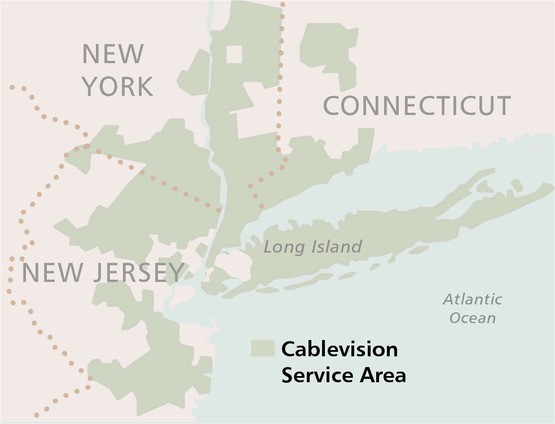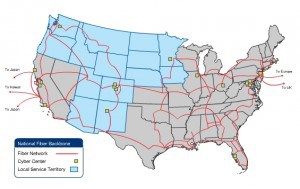 Cablevision Systems may be engaged in a long term effort to position itself for a sale, some New York investment firms have come to believe. The most likely buyer? Time Warner Cable.
Cablevision Systems may be engaged in a long term effort to position itself for a sale, some New York investment firms have come to believe. The most likely buyer? Time Warner Cable.
The bulk of Cablevision’s assets are located in several boroughs of New York, Long Island, New Jersey and Connecticut. Virtually all of their service areas, outside of the acquisition of Bresnan Cable in the mountain west, are adjacent to Time Warner, making an acquisition by the nation’s second largest cable operator a natural fit.
This isn’t the first time rumors of a Cablevision sale have been floated. The Dolan family has run the cable operator for decades, with family patriarch Charles Dolan still controlling a sizable interest in the company. Barron’s notes the senior Dolan is currently in his 80s. Son James, current president and CEO of Cablevision, seems more interested in his leadership role at Madison Square Garden, spun-off from Cablevision last year.
“I think the Dolans have positioned the company for a sale,” Mark Boyar, who heads Boyar Asset Management, told Barron’s.
Boyar points to Cablevision’s ongoing efforts to minimize their involvement in side businesses, such as MSG and cable networks like AMC, spun away from Cablevision on June 30.
Buyers like transactions to be simple and straightforward, and Cablevision’s operations increasingly meet both standards.
![]() On its own, Cablevision’s growth opportunities come mostly from rate increases, which subscribers routinely complain about. The company already enjoys the highest penetration rate among major cable operators and the highest average monthly revenue per subscriber — $150 a month vs. $113 for Time Warner Cable. With a depressed economy and fierce competition from Verizon FiOS, growing the business (and the stock price) has become increasingly difficult in a maturing industry unlikely to attract new subscribers.
On its own, Cablevision’s growth opportunities come mostly from rate increases, which subscribers routinely complain about. The company already enjoys the highest penetration rate among major cable operators and the highest average monthly revenue per subscriber — $150 a month vs. $113 for Time Warner Cable. With a depressed economy and fierce competition from Verizon FiOS, growing the business (and the stock price) has become increasingly difficult in a maturing industry unlikely to attract new subscribers.
Among the only prospects for subscriber growth on the horizon comes from satellite TV subscribers. But that alone may not be enough to keep investors satisfied, much less excited. A sale could bring shareholders a massive return on their investment, particularly if a bidding war breaks out between likely buyers Time Warner Cable and Comcast. Shareholders ultimately own the company, and should the Dolan family lose their love affair with cable, Cablevision and their subscribers will likely find themselves on the auction block.


 Subscribe
Subscribe



